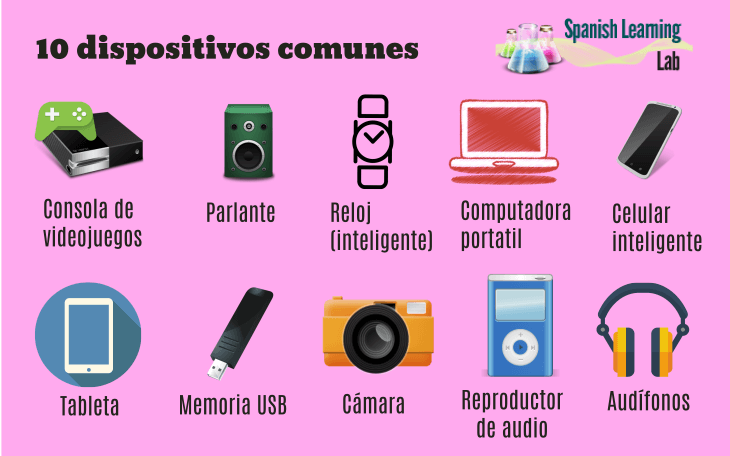Hola. In today’s lesson we will learn a list of electronic devices in Spanish and some common verbs and phrases that people will use when talking about gadgets in Spanish. More importantly, you will be able to practice with two listening activities on gadgets and phrases for finding lost property in Spanish. Comencemos…
Vocabulary introduction: A list of electronic devices in Spanish
We use the phrase “Dispositivos electrónicos” for electronic devices in Spanish. The word for gadget in the language is “Aparato”, but “Dispositivo” could be used too. The reason why we will learn the names of some common electronic devices in Spanish is because things like memory sticks (memorias) and phones (teléfonos) are among the most commonly lost items according to this article posted by Express. Furthermore, people talk about gadgets regularly.
Some electronic devices in Spanish already have a fixed gender, e.g. “Audífonos”. Additionally, some gadgets in Spanish may have more than one name such as a PC, which can be called “Computadora” and “Ordenador”. Most likely, you will listen to people talk about “Computadoras” in Latin America and “Ordenadores” in Spain. As for smart devices, we would usually add the adjective “inteligente” after the noun, so as you may guess “a smartwatch” would be called “un reloj inteligente”. With that said, here is a list of electronic devices in Spanish. Please make sure to memorize them as they will be used later in the examples and listening activities.

Common Questions and Phrases about gadgets in Spanish
Here is a list of questions people often ask when looking for lost items, as well as verbs and phrases they use when talking about devices in Spanish and the activities they can do with them. Some of these activities are somewhat related to hobbies and free time activities in Spanish. Pay attention to the main verb in each statement and the way the vocabulary was used too. Click on Play to listen to the examples.
|
¿Qué estás haciendo? – Estoy jugando un juego muy entretenido en la consola (de videojuegos)
What are you doing? – I am playing a very entertaining game on the video games console
|
|
¿Qué compraste? – Compré un parlante Bluetooth.
What did you buy? – I bought a Bluetooth speaker .
|
|
¿Qué es eso? – Es un reloj inteligente.
What is that? – It’s a smart watch.
|
|
¿Sábes dónde está mi computadora? – Está sobre la mesa dentro de un bolso negro.
Do you know where my computer is? – It’s on the table inside a black bag.
|
|
¿Tienes un celular nuevo? – Si, es un teléfono inteligente. Ya instalé varias aplicaciones.
Do you have a new cell phone? – Yeah, it’s a smart phone. I already installed several applications.
|
|
¿Qué opinas de esta tableta? – Creo que es muy grande.
What do you think of this tablet? – I think it’s very big.
|
|
¿Qué capacidad tiene tu memoria USB? – Puede almacenar 16 GB.
What is the capacity of your USB memory? – It can store 16 GB.
|
|
Me encantan tus fotos – Gracias, las tomé con esta cámara profesional.
I love your photos – Thank you, I took them with this professional camera.
|
|
¿Cuántas canciones tiene tu reproductor (de audio)? – Tiene 500 canciones.
How many songs does your audio player have? – It has 500 songs.
|
|
¿Qué estás buscando? – Estoy buscando mis audífonos ¿Los has visto?
What are you looking for? – I’m looking for my headphones. Have you seen them?
|
Listening Activity No.1: Describing electronic devices in Spanish
Listen to someone using adjectives and common verbs for describing electronic devices in Spanish. You will be given three options and you have to choose the device that best suits the description provided.
Listening Activity No.2: Looking for lost property in Spanish
Key Spanish phrases in the conversation:
- “Olvidé donde lo dejé” means “I forgot where I left it”
- “¿Ya lo buscaste…?” means “Have you already looked for it…?”
- “Una y otra vez” means “again and again”
- “En todos los rincones” means “on every corner”
